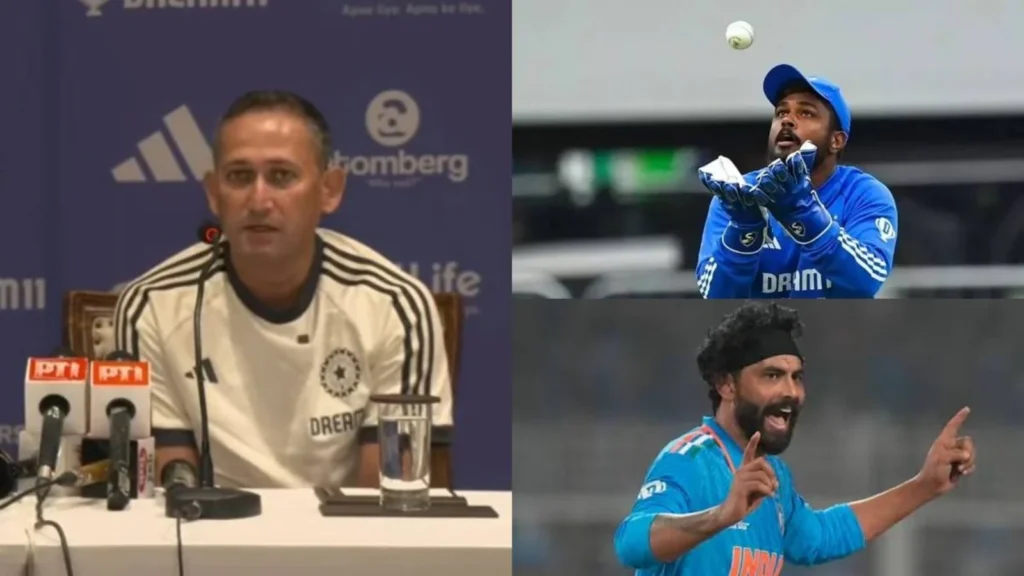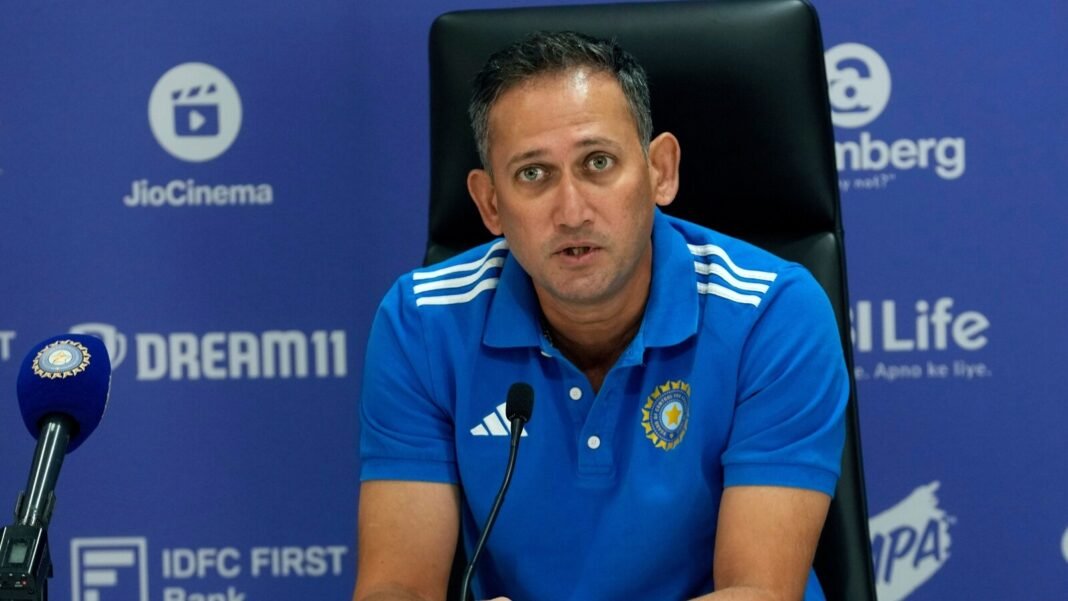
India’s five-wicket loss in the Leeds Test against England has opened a floodgate of criticism and introspection. What appeared to be a commanding position for India, with a target of 371 runs for England to chase in the final innings, turned into a massive disappointment as the hosts pulled off a remarkable win. The defeat has now placed Ajit Agarkar, the Chairman of Selectors, under immense scrutiny. With India now trailing in the series, the pressure is mounting on the selectors to make “bold decisions” ahead of the second Test.
Jadeja’s Role Under the Scanner After Ineffective Performance
One of the major talking points after the loss has been the performance of Ravindra Jadeja, whose role as a frontline spinner in overseas conditions has come under sharp focus. Despite favorable conditions with rough patches created for left-arm spinners, Jadeja struggled throughout the final day. While he eventually managed to dismiss Ben Stokes late in the day, it was too little, too late. England opener Ben Duckett repeatedly attacked Jadeja with reverse sweeps, and the Indian spinner had no answers.
Over the course of the Test, Jadeja bowled 47 overs, conceding a massive 172 runs and taking just one wicket. His lack of effectiveness in troubling the batters when it mattered the most has raised serious doubts about his ability to lead the spin department in challenging overseas conditions like England. For a team aspiring to win a Test series abroad, the failure of its key spinner to make a significant impact is a huge concern.
Jasprit Bumrah’s Off Day Exposed India’s Bowling Fragility
Adding to India’s bowling woes was a rare off-day for Jasprit Bumrah, who failed to take a single wicket. Bumrah’s inability to strike left the Indian bowling attack looking toothless, and without a quality spinner to support the pace battery, India failed to exert any real pressure on England’s batters during the final innings. The team looked imbalanced and overly reliant on individual brilliance rather than having a well-rounded bowling unit capable of taking 20 wickets.
Ian Chappell Slams Selection Strategy and Overreliance on All-Rounders
Former Australian captain Ian Chappell has added fuel to the fire with his scathing criticism of India’s team selection and strategy. In his column for ESPNcricinfo, Chappell questioned India’s obsession with selecting all-rounders or bowlers who can bat a little, often at the cost of a genuine specialist. He emphasized that Ravindra Jadeja is not a frontline spinner in English conditions and should only be considered if his batting ability is a strong enough asset to justify his inclusion.
According to Chappell, “If India are to reverse their fortunes in this series, then a better-balanced team is required.” He urged the management to rethink the balance of the playing XI, suggesting that the current approach is hurting India’s chances, especially in foreign conditions where specialist skills are more crucial than versatility.
Selection of “Insurance Players” Hurting Team Balance
Ian Chappell also targeted the practice of selecting part-time bowling options as insurance against top-order collapses. He cited the example of Shardul Thakur, who was picked as a bowling all-rounder in the first Test but bowled only 16 overs across both innings. Despite managing to dismiss Ben Duckett and Harry Brook in a single over, Thakur was underused. Chappell believes such decisions reflect a lack of trust in both the top-order batters and the specialist bowlers.
He stressed that “The top six must be trusted to deliver the runs,” and the bowling combination should be focused purely on taking 20 wickets, not on offering batting depth. This comment directly challenges the recent selection trends of the Indian team, where batting depth often seems to outweigh bowling efficiency in decision-making.
Selectors Must Lead with Courage and Clarity
Chappell didn’t hold back when pointing fingers at the Indian selectors, especially Ajit Agarkar, stating clearly that the selectors are now under pressure. He argued that just as batters and bowlers are expected to take risks on the field, selectors must also be courageous and willing to take bold decisions off the field.
In Chappell’s view, selection is a leadership responsibility, and it is high time that Indian selectors stop playing it safe and start trusting specialist players to do their jobs. Whether it’s choosing a proper spinner or backing the core batting unit without unnecessary backups, clarity and conviction are now the need of the hour.
India’s Over-Reliance on Multi-Role Players Backfiring?
The current Indian team setup reflects a pattern of over-reliance on players who can perform multiple roles—a trend that might be backfiring in longer formats like Test cricket. In white-ball cricket, such flexibility is often a strength, but in red-ball cricket, specialization remains critical. A genuine fast bowler, a reliable top-order batter, or a wicket-taking spinner can be far more valuable than a jack-of-all-trades in crucial Test situations.
India’s failure to defend 371 in the fourth innings is not just a tactical defeat, but a reflection of poor planning. The lack of a go-to spinner, the underutilization of all-rounders, and the inconsistent use of strike bowlers show a deeper problem in team composition and strategic selection.
What Lies Ahead: Edgbaston Test Becomes a Must-Win
The second Test at Edgbaston in Birmingham, starting Wednesday, July 3, has now become a virtual must-win for India. The team must regroup, reassess, and possibly make significant changes to the playing XI. Will India finally field a specialist spinner like R. Ashwin or Kuldeep Yadav? Will Jadeja retain his place in the side? Will Shardul Thakur get another opportunity, or will the selectors go for a proper fourth seamer or a swing bowler better suited to English conditions?
These are some of the tough questions facing Ajit Agarkar and the selection panel, and the answers could well define India’s fate in this series. A win could restore balance and confidence, while another defeat might lead to louder calls for overhauling the selection policy.
As pressure mounts on the selectors and the team management, it is becoming increasingly clear that sticking to safe and familiar choices may no longer work. India’s ambitions of winning overseas Test series will remain unfulfilled unless they show the willingness to trust specialists over bits-and-pieces players.
Ajit Agarkar, in particular, finds himself at a crucial crossroads. His decisions in the coming days will be closely watched and heavily scrutinized. With former players like Ian Chappell raising valid concerns, the time for vague strategies and half-hearted selections is over. It’s time for bold, clear-headed, and confident leadership in team selection.The road to redemption starts at Edgbaston, and the clock is ticking for India to get its act together—both on and off the field.


































